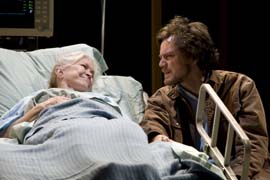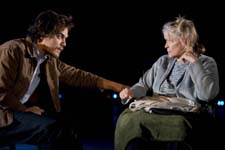
Paulanne Simmons
The Public Theater Nurtures "A Little Flower of East Orange"
 |
| Ellen Burstyn, Michael Shannon. Photo by Monique Carboni. |
Directed by Phillip
Seymour Hoffman
A co-production of the
LAByrinth Theater Company and The Public Theater
The Public Theater
425 Lafayette Street
Opened April 6, 2008
Tues. 7 p.m., Wed. thru Fri. 8 p.m., Sat. 2 p.m. & 8 p.m., Sun.
2 p.m. & 7 p.m.
$50 until April 20, $65 two weeks extension until May 4
Reviewed by Paulanne Simmons preview, April 3, 2008
"The Little Flower of East Orange" could easily be just one more play about a dysfunctional family that keeps its secrets if it weren't for Stephen Adly Guirgis' sensitive writing, Philip Seymour Hoffman's muscular direction and a superb cast headed by Ellen Burstyn. It is this combination of talent that turns the play into a gripping drama of raw emotion and exposed nerves.
 |
Michael Shannon, Ellen Burstyn. Photo by Monique Carboni. |
Because Burstyn has the big name, it's easy to see her character, Therese Marie, a woman who has found little joy in life or motherhood, as the central character. But it is her son Danny (Michael Shannon), whose narration ties the play together, and his suffering that at times seem most acute.
Shannon opens the play when he is led, scruffy and handcuffed, center stage and in a cracked voice begins the story. Soon the focus shifts from his misadventures (addictions, failed relationships, aimless wandering) to the plight of his mother, hospitalized after an accident at the Cloisters.
At first, Therese Marie refuses to let anyone at the Bronx charity ward know who she is or exactly how she ended up at the Cloisters. She much prefers conversing with phantoms conjured up by her troubled mind set free by pain and morphine: her deaf and abusive father, Bobby Kennedy, Jimmy Stewart.
Eventually, Dr. Shankar (Ajay Naidu) tricks Therese Marie into revealing her identify so that her children can be called in to claim their mother. It turns out Danny has a sister, a stoic, somewhat self-righteous young woman named Justina (Elizabeth Canavan), who seems only slightly less traumatized and more in-touch than Danny.
Therese Marie, who is as feisty and cantankerous as she is loving, doesn't want to be a burden on her children, and one can easily see why. Neither of them has the mental fortitude to care for someone as helpless and vulnerable as their mother. What's more, Danny is convinced it is his job to get his mother to face all those long-festering demons she has kept buried since her childhood.
Their overwrought, over-written descent into Marie Therese's past and the pivotal act that ruined her life is the only part of the play that is unduly bogged down by narrative. It is certainly a highly charged scene, explaining what has poisoned her relationship with her own children, but it goes on too long and seems too much like a biography.
"The Little Flower of East Orange" benefits from some extremely fine acting in supporting roles, principally the terrific David Zayas as the hospital worker Espinoza and Liza Colon-Zayas as the nurse Magnolia. Together they provide most of the humor that lightens the prevailing darkness of the drama.
Many of the questions "The Little Flower of East Orange" poses are never answered. Some characters just disappear. But, in the context of the play, that really isn't too disturbing. In life, don't people disappear all the time? Aren't there issues that never get resolved? And aren't we always left wondering why?

| lobby | search
| home | cue-to-cue |
discounts | welcome | film
| dance | reviews |
| museums | NYTW
mail | recordings | coupons |
publications | classified |